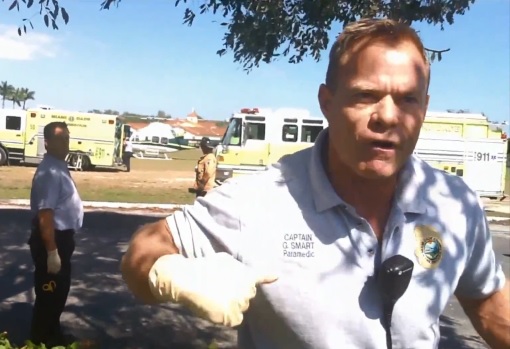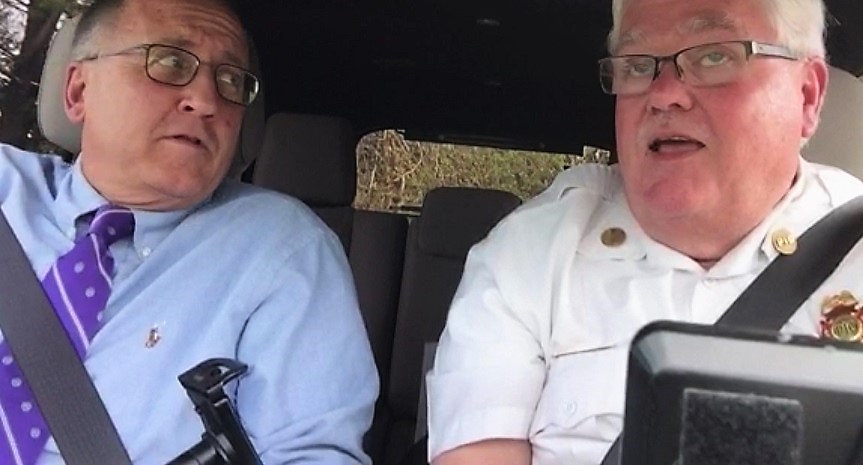Former DC 911 head knew about newborn’s death but failed to say so at 2020 hearing
Former & future director briefed deputy mayor & others with details of tragic 911 failure days before avoiding questions from council member
Looking for a quality used fire truck? Selling one? Visit our sponsor Command Fire Apparatus
When Karima Holmes appeared at a June 9, 2020, virtual DC Council hearing (above) she had known for three weeks DC 911 made serious mistakes after a woman gave birth inside her Upper Northwest apartment. As the director of DC’s Office of Unified Communications (OUC) it was her job to know. She even said as much during that hearing. But somehow Holmes couldn’t recall the tragic incident when questioned by the chairman of the council committee responsible for OUC oversight.
It was not a minor incident. The newborn was in cardiac arrest by the time DC Fire and EMS arrived more than thirty-minutes after the 911 call began. STATter911 has since learned an investigation was conducted within 24 hours of the May 17 call. It determined a call-taker didn’t follow the 911 center’s address verification policy. This resulted in DC Fire & EMS being sent first to a wrong address. The investigators also pointed out concerns the call-taker didn’t follow a script for pre-arrival instructions about caring for a newborn. This appears to have led to a misunderstanding that possibly contributed to the child’s death.
STATter911 also learned that within 48 hours of the botched call Holmes briefed top DC officials with the details about the 911 failure. Included were then Deputy Mayor for Public Safety and Justice and current City Administrator Kevin Donahue, Chief Greg Dean of the DC Fire and EMS Department and Chief Peter Newsham of the DC Police Department. Despite recent personal involvement in the case Holmes was unable to recall the incident when questioned by Council member Charles Allen. She also couldn’t recall a second botched 911 call where someone died. That one occurred just four days before the hearing.

The hearing wasn’t the first time Holmes failed to provide direct answers to DC council members asking about serious 911 mistakes. The previous November, Holmes left out key information when asked about OUC delays during a deadly and controversial fire at 708 Kennedy Street, NW. Despite extensive questioning from three council members on why it took four-minutes to process the call, Holmes never mentioned that part of the delay was due to the call being coded wrong by a 911 worker. STATter911 wrote about this for The DC Line on the one-year anniversary of the fire.
In addition, in an August 2020 story, STATter911 showed problems with annual statistics OUC provides the council. Specifically, over a five-year period the number of times fire, EMS, and police were dispatched to wrong addresses was ridiculously low.
All this is again relevant because Holmes will soon get more chances to testify before the DC Council. Next week, Holmes is expected to return to run DC 911/311. She led OUC for five years before resigning in January 2021. Mayor Muriel Bowser announced the rehiring of Holmes in a press release last week.
One thing is certain from her first time around: Karima Holmes frequently failed to be open and transparent with council members, the press, and the public about 911 mistakes.
Information for this story came from a Freedom of Information Act request by the publication “Communications Daily” that was shared with STATter911 in November 2020. It included 911 calls, radio traffic and paperwork related to multiple investigations. In addition, STATter911 talked with current and former DC government officials familiar with the events. All requested anonymity in order to be able to talk freely about these issues.
STATter911 contacted Karima Holmes for her comments about this story. In a text yesterday (Tuesday), Holmes said she is not a District employee until next week and suggested STATter911 reach out via “official channels.” STATter911 also was unsuccessful in getting comments from Deputy Mayor for Public Safety and Justice Chris Geldart, City Administrator Kevin Donahue, and Council member Charles Allen.
The hearing
More than four hours before the June 9, 2020, hearing STATter911 sent an email to OUC’s public information officer. It was a request for information about a story being published later that day. STATter911 had learned DC Fire & EMS was sent to the wrong address on two cardiac arrest calls less than three weeks apart. One was the 3:30 a.m. May 17 call for the birth of a child. Somehow fire and EMS were sent to an apartment on Wisconsin Avenue instead of Massachusetts Avenue. The second call was on June 5. In that incident, OUC dispatched fire and EMS crews to the 400 block of Oglethorpe Street in Northwest instead of the same address in Northeast.
While an email was sent to OUC, getting a response wasn’t likely. Months earlier, the agency stopped acknowledging STATter911 requests for information. This lasted an entire year until Holmes’ departure.
Knowing the hearing with OUC’s director was hours away, STATter911 also alerted Council member Allen’s office about the story in hopes Allen could get answers. In fact, the council member did ask questions about the two incidents, but Karima Holmes seemed to do everything but provide a direct answer. You can watch Allen’s questioning in the video at the top of this story.
“My understanding is that just recently, we had two cardiac arrest incidents where the dispatch went to a wrong address,” Allen told Holmes. “Have you had a chance to look into either of those?”
“I don’t know specifically. I may have. And so, just to speak to in general, missed addresses … ,” was the initial reply from Holmes. This was followed by two-minutes and fifteen-seconds of Holmes explaining the many reasons calls can be dispatched to a wrong location. She also mentioned without detail another blown address that happened pre-Covid. Holmes wrapped up her explanation by saying, “Without knowing the specific incidents, I do know that I could have those come through and it falls into one of those categories.”
Allen then provided specifics. “One of them was a northwest, northeast, so a quadrant mistake. And one of them was a state street address, I think it was. A Wisconsin and a Massachusetts avenue.” He also expressed some skepticism that the 911 director was struggling to remember two recent, serious mistakes. “I guess a case like that feels like that would be a high-profile case. If somebody didn’t get there in 45 minutes, I think in one of them, it was a young child. Those would be known to you, right? That level of an error would be known to you, correct?”
“Yes, they would definitely make it to me,” Holmes replied. Holmes then went on for another two-minutes, 45-seconds without providing information about either call. Holmes did say, “I just want to make sure that I’m completely transparent.” She also complained about a bad reputation OUC was getting over 911 failures. “I do want to make sure that there’s been a stereotype that has happened to me, I feel, of the agency.” Holmes also pointed out that 911 actually did a good job on two incidents “that ended up getting a lot of traction.”
One of the most interesting parts of the response was when Holmes again talked generically about how call-takers make location mistakes. The description she used sounded suspiciously like what happened during the 911 call for the newborn. “Sometimes it’s our call-takers take calls, and they honestly believe they put the address in right. Sometimes, I had one call I listened to, and the person was muffled because they were trying to do something and the phone was in and out, and you couldn’t really completely understand the address.”
Holmes also told Allen, “I think the Wisconsin, I don’t know how long ago. And I’m so sorry. I don’t know how long ago these cases are that you’re speaking to, but I can get them.” A question to Allen about whether he ever got the information has not been answered.

Karima Holmes didn’t know how long ago these cases were yet one was just four days before the hearing. Holmes was able to keep the public from knowing the heartbreaking details of that call for five months. What STATter911 didn’t know for its initial report is that it involved a 13-year-old girl, Maria Shepperd, doing CPR on her mother Sheila. The call-taker kept telling Maria help was on the way. It wasn’t. The call-taker accidentally sent DC Fire & EMS to the wrong quadrant of the city. By the time paramedics got to 59-year-old Sheila Shepperd — 21 minutes after the 911 call began — they couldn’t revive her. This story was covered extensively in November 2020 when the national publication “Communications Daily” received the 911 call and related information through a FOIA request.
Under the same FOIA, “Communications Daily” received the 911 call and other details about the childbirth call on Massachusetts Avenue. Until now, the details of that call have not been reported.
A newborn dies
It was an odd call. The 26-year-old mother apparently didn’t know she was pregnant, even though this was her sixth child. But there she was in a tub with a newborn child as the man beside her talked with DC 911. The man described the woman as his “lady friend”. During the call, the man would at times cry and at other times sing a children’s song. The 911 call began at 3:31 a.m. on May 17, 2020
The first mistake by the 911 call-taker was about the location. The address was muffled. It was hard to hear. The man was busy with the baby and mother at the time and the impression was he didn’t speak directly into the phone. Somehow the call-taker believed he said they were at an apartment at 3100 Wisconsin Avenue NW. Instead of verifying the address further DC Fire & EMS crews were quickly sent to the Wisconsin Avenue location. Firefighters got to the scene and said the apartment number they were given doesn’t exist in the building. That’s when the call-taker attempted to further verify the address. This time the address was clear. It was an apartment at 4100 Massachusetts Avenue NW. At this point fourteen-minutes had been lost.
During the call, there appears to have been a tragic misunderstanding over pre-arrival instructions on how to care for the newborn. These instructions are scripted and are available on the call-taker’s computer screen. At one point the call-taker told the man to “lay the baby on the stomach” and “against the mother.” The intention was for the baby to be placed on the mother’s stomach. Instead, investigators believe the newborn was placed face down on its own stomach. The call-taker asked multiple times if the baby was breathing okay and was assured that was the case. Unfortunately, it wasn’t. Some in the DC government familiar with what happened tell STATter911 they believe the newborn suffocated. To be clear, a spokesperson for the DC Office of the Chief Medical Examiner says they’ve been unable to find an autopsy report connected to this case based on the date and circumstances provided by STATter911.
The call-taker was counseled and faced disciplinary action over the failure to properly verify the address. The information provided to STATter911 about this case does not show that the call-taker faced disciplinary action over the problems with pre-arrival instructions.
Holmes is consistent
Three months after the hearing where she avoided talking about two 911 failures in three weeks — where people died — Karima Holmes was given another chance to publicly address these tragic incidents. She didn’t.
STATter911 brought them up, along with OUC’s lack of transparency, during a September 3, 2020, segment of WAMU’s “The Kojo Nnamdi Show.” Holmes was on the same program. Nnamdi asked Holmes, “What is your office’s response to some of the problems we’ve been talking about?”
Holmes replied, “Sure. Thank you, Kojo, for giving me the opportunity to talk about my agency. And before I directly address that question, let me start off by saying that it is abundantly clear that Dave Statter is making a concerted effort to fool the public into thinking there’s a systematic problem with D.C. 911. There is not. Now, I’m not saying that we don’t ever make an error. We do. But he has misrepresented and distorted the truth.”
The Office of the DC Auditor might disagree with Holmes’ assessment of her agency. It wasn’t long after the radio appearance that Auditor Kathy Patterson made the decision to take a close look at OUC’s operations under Holmes’ leadership. It’s something Holmes told Nnamdi she welcomed. The audit was prompted by STATter911’s reporting and concerns expressed to Patterson by Advisory Neighborhood Commissioners. The report is titled, “District’s 911 System: Reforms Needed to Meet Safety Needs.”
In her letter introducing the report, Patterson wrote that the audit discovered “inadequate supervision of the call-taking and dispatch operations, inconsistent or ineffective use of call script protocols, inconsistent use of location determining technology tools to determine locations, and insufficient management follow-up on after-action reviews.” Systemic failures.
One thing that wasn’t addressed in the audit was the issue of transparency and openness. But it’s something Kojo Nnamdi wanted to know more about:
Nnamdi: Well, it seems that in order to — to portray the full picture, there needs to be transparency. And what Dave Statter is saying is that [Office of Unified Communications] does not have a great deal of transparency. All of the situations you are now explaining to me should, I guess, have been also explained publicly. Shouldn’t they?
Holmes: They have been. I have to be completely honest. Dave Statter is not my oversight. I have our mayor. I have our deputy mayor, and we also have Council. They were explained. They do have this information. All of that gets investigated, and we do a full investigation, not only with just the radio traffic that is heard on the social media. We listen to the 911 call and also the information that is given from a caller that is usually going through an emergency to my call taker, to my dispatcher, to the responders. And anytime an error is made, we address it. So, that is not true. We are transparent.”
Despite her claims of transparency at both the council hearing and the radio show, Karima Holmes worked hard to avoid sharing information and publicly speaking about DC 911’s mistakes. Particularly the ones where people died. She’s never publicly addressed Sheila Shepperd’s death or the death of the newborn child on Massachusetts Avenue, NW. When she returns to OUC next week will Holmes continue to just talk about transparency, or will she actually practice it?





